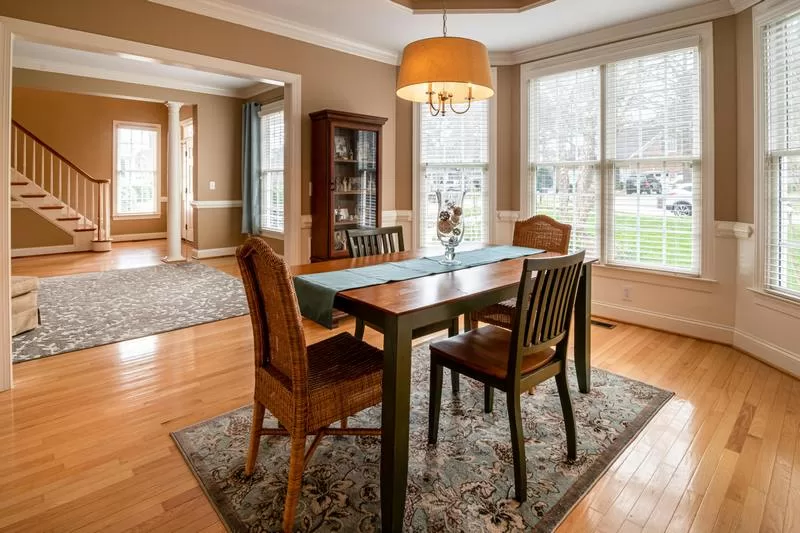Deciding whether to refinish floors yourself or hire experts involves a balance of saving money versus ensuring quality and ease.
Doing it yourself can be cheaper and give a sense of achievement, but it demands time, energy, and the possibility of errors. On the other hand, using professional services, although pricier, guarantees a high standard and conserves time and energy.

This article examines both choices, highlighting their advantages, disadvantages, required tools, methods, and costs, aiding readers in making a well-informed choice about wood floor refinishing.
The Do-It-Yourself Endeavor: Economical Prudence or False Economy?
The Benefits of DIY:
- Cost Savings: Doing it yourself is often cheaper. You only pay for materials and tools, not for expert work.
- Learning New Skills: It’s a great chance to acquire a new ability. Finishing such a task can be very rewarding.
- Complete Project Control: With DIY, you manage everything about the refurbishing, from material choice to your work schedule.
The Drawbacks of DIY:
- Time Needed: Restoring hardwood floors takes a lot of time. It’s not just the work itself; drying and curing times extend the project.
- Risk of Errors: Lacking professional skills, you might make mistakes like uneven sanding or incorrect finish application, which can be expensive and hard to fix.
- Physically Demanding: This work needs a lot of physical effort, which can be tough if you’re not accustomed to manual work.
Materials and Tools Required:
- Sander: Use a drum sander for large areas and an edge sander for corners.
- Sandpaper: Start with coarse (around 36-grit) and progress to fine (up to 120-grit).
- Wood Stain: Pick a shade that suits your house.
- Sealant: Use polyurethane or a similar product for hardwood protection.
- Safety Equipment: Dust mask, safety glasses, ear protection, and gloves.
- Other Tools: Brushes or rollers for stain and sealant, a vacuum for cleaning, and a hammer and nail set for any sticking-out nails.
Steps in DIY Floor Refinishing:
- Preparation: Clear the room of furniture and old flooring. Make sure the area is well-aired.
- Sanding: Begin with rough sandpaper to strip old finish, then move to finer ones. Use the drum sander for big spaces and the edge sander for edges.
- Cleaning: Vacuum and clean the hardwood to eliminate all dust.
- Staining: Apply the hardwood stain and let it dry.
- Sealing: Apply a sealant, putting on several layers for strength, and let each layer dry well.
Is It Worth Hiring Professionals?
Understanding Professional Hardwood Floor Refinishing
Read Also :
Professional wood floor refinishing involves several steps:
- Assessment and Preparation: First, experts evaluate the floor’s state and prepare the area, which involves moving furniture and ensuring a clean workspace.
- Sanding: They use industrial sanders to strip off the old finish, smooth the hardwood, and ready it for staining. This step is usually dust-free due to modern equipment.
- Staining: With various stain choices, you can tailor the floor’s look. Experts offer advice on shades that best match your home’s style.
- Sealing and Finishing: They apply top-quality sealers to safeguard the hardwood and increase its lifespan. The choice of sealer depends on your preference and the floor’s use.
- Final Check and Clean-Up: After finishing, experts ensure everything meets standards and clean up thoroughly.
The Advantages of Hiring Experts
- High-Quality Work and Speed: Specialists in hardwood refinishing possess invaluable experience and skill, leading to exceptional results. They focus on fine details, achieving a level of finish that DIY attempts often fail to reach. Their proficiency in hardwood refinishing also translates into faster job completion, typically much quicker than a self-done project.
- Access to Top-Notch Equipment and Materials: Experts use advanced sanders, stains, and sealers, typically not accessible or too expensive for one-off projects. These tools and materials not only provide a superior finish but are also more durable.
- A Hassle-Free Experience: Employing professionals for hardwood floor refinishing means you don’t have to plan, carry out, or oversee the project. They take care of everything, including the prep, sanding, staining, sealing, and cleaning. This is especially beneficial for busy homeowners or those with little DIY know-how in wood floor work.
The Disadvantages of Hiring Experts
- Higher Upfront Costs: The main downside to hiring experts for hardwood floor refinishing is the expense. This covers their skills, labor, and the quality materials they use for the floors. Depending on your surface condition and the project size, the cost can be significantly higher compared to doing it yourself.
- Dependence on Their Schedule: You must accommodate the experts’ schedule, which may not always suit your preferred timing. During busy periods, there could be a wait before they can start on your project.
Cost Comparison: Examining the Expenses
Considering the refinishing of hardwood floors, the price plays a crucial role in choosing between doing it yourself or hiring experts. We will now look closely at both choices.
The DIY Route
- Materials: The main expenses in DIY come from buying needed items. These are sanders, stains, sealers, brushes, and more tools. Prices can change a lot based on quality and brand.
- Sanding Tools: Hiring a floor sander is a usual cost. The price varies from $50 to $100 each day, depending on how long you rent it and the sander type.
- Stains and Sealers: For a long-lasting effect, top-quality stains and sealers are important. They can cost between $50 and $200, based on the brand and how much you need for your surface.
- Other Items: Things like sandpaper, brushes, and safety gear also cost money. You might spend an extra $50 to $100 on these.
- Total DIY Cost: Adding all these, and refinishing the wood floor yourself can total $600 to $1,000. This can change depending on the floor size and the quality of materials used.
Employing Professional Services
- Labor Expenses: The biggest cost in professional refinishing is labor. Experts charge for their skill, time, and work.
- Materials and Tools Included: Often, the price professionals give includes the materials and tools, so you don’t need to rent or buy them separately.
- Work Scope: The total cost also depends on the floor’s size and condition. Bigger or more damaged floors need more work, which costs more.
- Extra Services: Sometimes, experts offer additional services like moving furniture or detailed edging, which increases the price.
- Total Professional Cost: On average, getting professionals to refinish a hardwood floor can cost $2,500 to $5,000. This varies with the professional’s experience, the project difficulty, and where you live.
Comparative Review of Hardwood Floor Refinishing
- Value for Money: Undertaking wood floor refinishing yourself might save money but requires significant time and carries the risk of mistakes. In contrast, experts ensure higher quality easily but are more expensive.
- Time versus Cost: DIY hardwood floor refinishing might appear cheaper, but if you value your time, the prolonged hours spent might not justify the money saved.
- Quality and Durability: Professional work usually results in higher quality and a longer-lasting finish, potentially saving money over time.
Final Thoughts
Deciding between DIY and professional hardwood floor refinishing hinges on balancing cost, time, effort, skill, and desired quality.
DIY can be more economical but demands more time and physical effort, with a risk of errors. Professional services, while pricier, guarantee expertise and a stress-free experience.
The right choice for refinishing varies based on individual circumstances, including budget, time availability, and quality expectations.
This analysis aims to guide homeowners in making an informed decision that aligns with their specific needs and resources.









